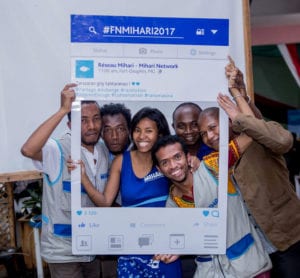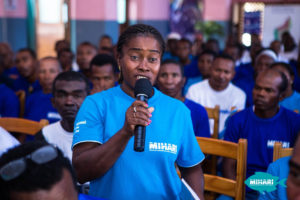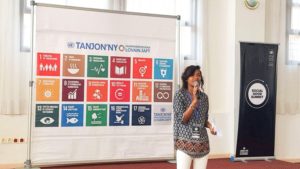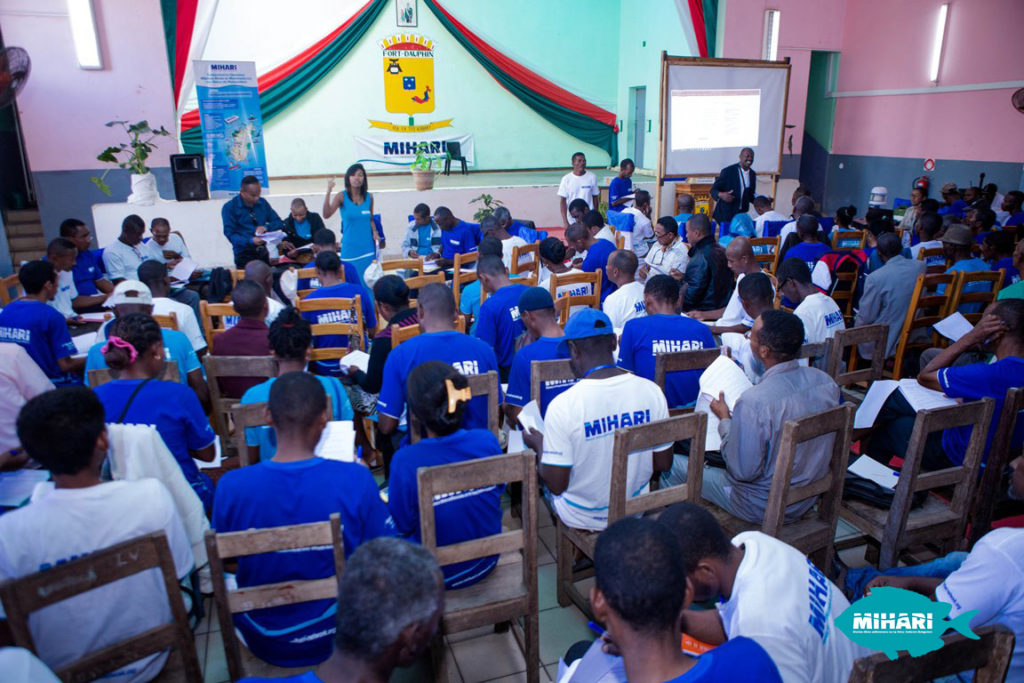Imagine that you are sitting on a beach in Madagascar, and that you see a pirogue sailing by. The pirogue comes to a stop, and the fisher gets out their line. Ten minutes later, you see them sit up, reel in their line and haul their catch onto the boat. How many of you imagined the fisher in this scene as a woman?
Last year, when the UNDP chose me to be one of the young leaders to speak at the SDG30 Social Good Summit , I asked this question to the hundreds of people in attendance, and only three said that they had imagined a woman. This was troubling to see, but it also gave me an opportunity to tell these people about the exciting changes occurring in Madagascar’s fishing communities. Fishing, like mechanics and mining, is commonly thought of as a man’s business in Madagascar. A few years ago I would have thought the same thing, but I know so much better now.

Coastal communities in remote areas of Madagascar are amongst the poorest and most vulnerable in the world, and fishing is often the only income-generating activity that they can rely on for their survival.
When I was a young girl growing up in Antananarivo, the capital of Madagascar, my deepest dream was to become a lawyer, speaking on behalf of clients and defending them with skilful negotiation. This dream was never to be realised; I failed the entrance exam I needed to major in law, and I was deeply disappointed. Little did I know that this setback would actually spur me on towards a career I’d never even dreamed of: defending the rights of marginalised fishers and speaking on their behalf for MIHARI (Madagascar’s locally managed marine area (LMMA) network).
When my lawyer dreams fell through, I decided to apply for a two-month training programme in Halifax, Canada, on ocean governance, and a year-long United Nations research project at the University of British Columbia in Vancouver about promoting sustainable management of Madagascar’s fisheries through the empowerment of coastal communities. I hardly knew about the fishing world before this point, and I had no idea that fisheries would quickly become a new passion of mine. Throughout 2014, as I was learning about the importance of community engagement in resource management, I often thought about the fishing communities I knew back home, and how what I was learning could help them. I returned to Madagascar in 2015 with new skills and determination, and when the position of National Coordinator with the MIHARI Network caught my eye I jumped at the opportunity.
Coastal communities in remote areas of Madagascar are amongst the poorest and most vulnerable in the world, and fishing is often the only income-generating activity that they can rely on for their survival. They are isolated – mostly due to bad road conditions – and their efforts and struggles remain largely unknown to the wider population. This is why the MIHARI Network was created: to empower these communities with a voice on a national and international level. By sharing best practice in LMMA governance across the network, we hope that one day Madagascar’s fishers can become leaders in sustainable locally led fisheries management and act as a model for other communities in the Indian Ocean and beyond.
These days I have two dreams for the future: that the MIHARI Network will continue to grow and empower the disenfranchised fishers of Madagascar, and that women in these communities might see me leading a predominately male network and think “I could do that too.”
I was not long into my role with MIHARI before I realised how unusual I was in the fisheries sector: a young woman working in the midst of hundreds of men at a decision-making level, when there are so many fisherwomen in Madagascar who never get a chance to have their say. While fishing is a predominantly male activity in many countries, this is not the case in Madagascar, where women play an active role in fishing in many regions. I believe passionately that there is nothing fishermen can do that fisherwomen cannot.

I sometimes feel sad and lonely when I see that the other women in the community meetings that MIHARI holds are almost speechless. On some occasions I’ve talked to the women after the meeting, asking why they’re so silent and so few.
Some of them mentioned that their husbands would get jealous, or that they were forbidden from doing certain activities, including conservation work, due to their husbands’ concerns about chores not getting done or the children being neglected. The general agreement was that it’s a cultural thing – there is a perception that decisions must only be made by men because women’s ideas are never good enough. What saddened me the most in these responses is that for these women, letting men take the lead feels natural because they have grown up believing they are inferior to men.
Seeing how these beliefs affect the daily lives of my fellow women inspired me to use MIHARI to help amplify their voices and help them to realise that they are by no means inferior, and that men do dream of seeing women speak up more. Our plan is to kick off a women-led fisherwomen leadership programme in MIHARI in July 2018, which aims to build their self-confidence and give them the necessary skills to participate equally in the decision-making process within their communities and beyond.
My job is a challenging one, but my hope for all marginalised fishers, men and women alike, is what gets me out of bed every morning to go to work. The changes I’m seeing in fisherwomen’s attitudes are truly wonderful. They are starting to speak up more and take their destiny into their own hands; for example in the Velondriake LMMA, southwest Madagascar, 38% of the board members of local associations are now composed of women compared to only 13% a few years ago. Almost all people practicing on-foot octopus fishing in this area are women, and women are increasingly becoming involved in fisheries monitoring, so it’s absolutely necessary that they have a voice!

When I spoke at the SDG30 Social Good Summit, I knew that it was another opportunity to get the word out about the remarkable work being done by Madagascar’s fishing communities, and about the vital importance of women’s involvement in fisheries management. I knew that not everyone would agree with me, and that there’s still a long way to go, but I will continue to be an advocate for these communities, giving them a voice where they currently have none. These days I have two dreams for the future: that the MIHARI Network will continue to grow and empower the disenfranchised fishers of Madagascar, and that women in these communities might see me leading a predominately male network and think “I could do that too.”
A blog posted on one of our partner's website: NGO Blue Ventures.

